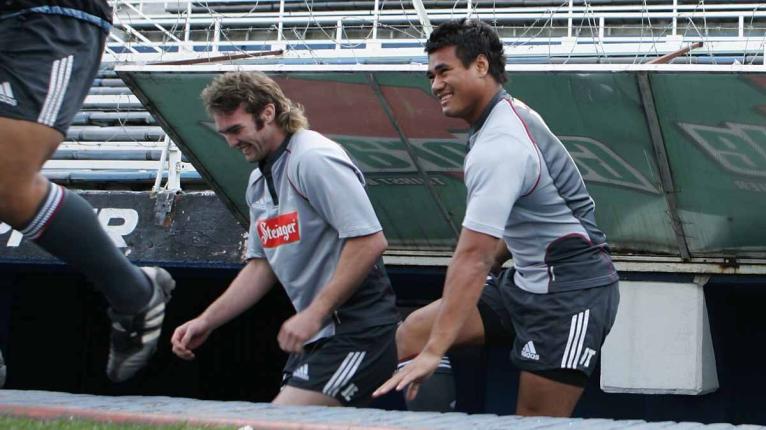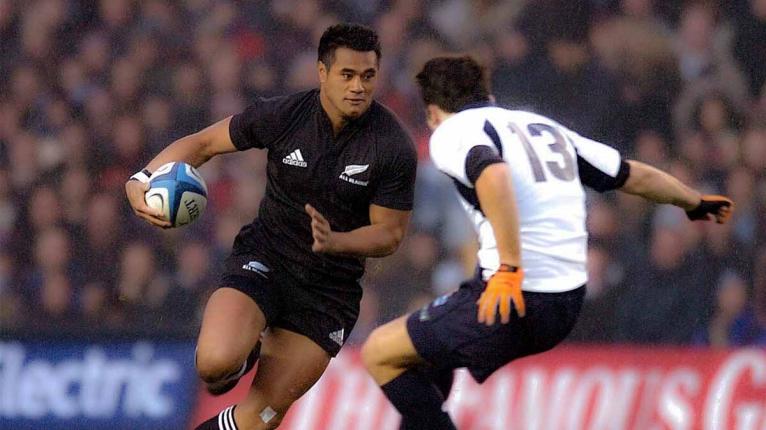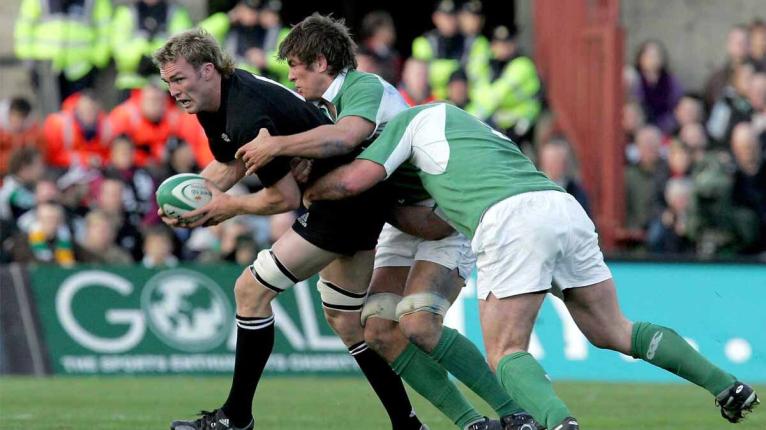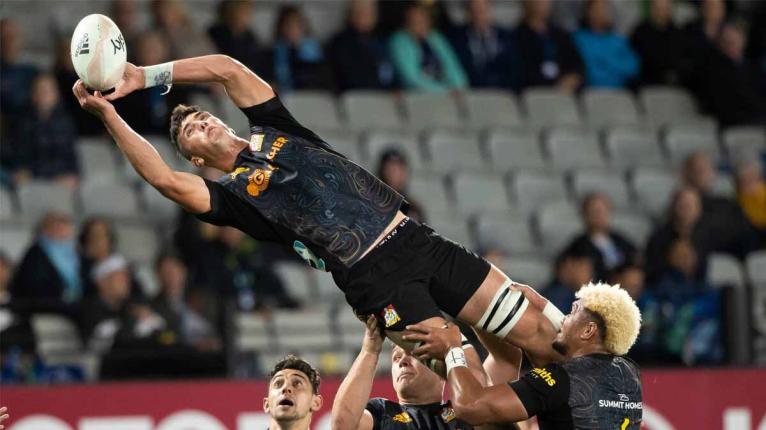A big lump of an athletic lad plucked straight out of Taranaki to be thrust into the All Blacks boiler room for an end of season tour – that’s not a new story.
It’s a great story. A fun story. An intriguing story, but Josh Lord, the 20-year-old lock called up by the All Blacks despite having barely played in the professional ranks, is not an original story. It is a case of history just about repeating itself.
In October 2005, Jason Eaton was minding his own business in the NPC when All Blacks coach Graham Henry rang him to ask how did he fancy heading to the UK and helping the national side in their quest to secure a Grand Slam?
The 23-year-old Eaton had managed to escape the notice of every national age-grade selector. He’d been of no interest to any of the Super Rugby clubs and even his home province, Manawatu hadn’t been too bothered when he shifted to Taranaki after a couple of quiet campaigns.
But Henry and his fellow coaches had clapped eyes on Eaton when he had played for Taranaki earlier in the year against the British & Irish Lions.

They liked his size – he was 2.03m and rangy, the sort of athlete they knew they could pack a bit of a heft on to without losing any of his obvious mobility.
And they liked the fact that Eaton, with no real experience at even provincial level, had rolled up his sleeves and thrown himself at the highly experienced and professional Lions with no fear.
Lock had also been a problem position for the All Blacks in 2004. They needed more depth having seen Norm Maxwell retire and Simon Maling head offshore. They had senior locks Ali Williams and Chris Jack and had called up rookie Super Rugby sensation James Ryan in June.
But they hadn’t been impressed by anyone else during Super Rugby and so they spun the wheel and took what would have been the mother of all gambles by selecting Eaton, who had never even played Super Rugby.
The only reason it wasn’t the greatest surprise selection of all time was because Henry also selected Auckland’s 19-year-old utility back Isaia Toeava for that tour.
While Eaton played two tests on that tour and Toeava one, both of them looking composed and ready, the problems struck when they came home.
This was an even bolder and unconventional selection and so Eaton never quite managed to bask in the glory of being the single greatest bolter of the professional age.
Toeava had starred for the New Zealand Under 19 team earlier that year – and it just so happened that All Blacks assistant coach Wayne Smith had been in attendance.
Smithy, one of the greatest minds in the New Zealand game, was sure he was looking at one of the most talented prospects the country had ever produced and that they should take the risk of picking him in 2005 to try to build his experience to take him to the World Cup in 2007.
It all made sense to some degree and while Eaton played two tests on that tour and Toeava one, both of them looking composed and ready, the problems struck when they came home.
The selectors had underestimated how hard it would be psychologically for both men, especially Toeava, to go from obscurity to the All Blacks so quickly and with so little preparation.

Mentally, Toeava was broken by the sudden expectation and demands that were placed upon him. The phrase ‘too much too soon’ applied to him and a relatively shy, quiet young man was hopelessly equipped to deal with the pressure of being an All Black.
When he returned, he also had to shift to Wellington, as the Hurricanes were told they had to find a place for him and the net result was that Toeava never managed to fill his potential as an All Black.
He won 36 test caps but never held a regular starting place. No one, including himself, could work out his best position and he bounced around between centre, wing and fullback for the All Blacks, but also played first five and second five for the Blues, for whom he returned in 2007.
He played at both the 2007 and 2011 World Cups, but as a fringe member of the squad and as a player the world could see was talented, but lacking in confidence. He left for France in 2012 to start afresh.
Eaton was much the same in that he never managed to fulfil his potential either. He filled out a bit, got himself fitter but never managed to become an imposing figure. He missed the 2007 World Cup because of serious injury and never really kicked on: a brief test recall in 2009 came but by 2011, he was nowhere near All Blacks selection and wasn’t always starting for the Hurricanes either.
We put him under too much pressure too early. He was probably the most talented rugby player I’ve ever seen and we put him in the team too early.
Steve Hansen on Isaia Toeava
Both men were scarred by being called up too early. The All Blacks hadn’t accounted for the psychological impact of hauling them out of obscurity the way they did and former head coach Steve Hansen, who was an assistant in 2005, said to the New Zealand Herald before he left the former role in 2019: “I look back on my time as a selector and I have definitely picked a couple of players that weren’t ready. It’s not you pick the wrong person, sometimes you pick them too early.
“I look at Isaia Toeava as one of those. We put him under too much pressure too early. He was probably the most talented rugby player I’ve ever seen and we put him in the team too early.
“It’s an easy mistake to make. You think he’s got all the rugby attributes but that’s where you learn they’ve got to have the mental fortitude to cope with that whole thing.
“You feel bad about that because there’s a young man who went on and won a World Cup medal but we didn’t see the best of him because we put him under too much pressure too early.”

The fate of Eaton and in particular, Toeava, is a story current All Blacks coach Ian Foster knows well. He was head coach at the Chiefs in 2005 and saw from close range how both men fell apart after their respective All Blacks selections.
So he was conscious, along with fellow selector Grant Fox, about the dangers of calling Lord into the All Blacks for the end of year tour to the USA and Europe after the youngster had only managed a handful of appearances for the Chiefs.
But so too was Foster cognitive that Lord is a completely different beast to either Toeava or Eaton. The professional system has changed beyond recognition in the last 16 years and the difference between Eaton and Lord at roughly the same age is staggering.
Starting with the physical stuff. Even at 23, Eaton was underdeveloped because he’d emerged through a school and provincial system that was nowhere near as sophisticated or scientific as the one today.
Having been schooled at Hamilton Boys’ High School, Lord has been doing weights since he was 16, been training five times a week from the same age, while also having a deeper knowledge of nutrition, game analysis and skills development.
He was 107kg when he was first picked – tall and lean, with no real muscle on his bones. He’d barely been exposed to a weights programme and his general conditioning was based on two training nights a week and maybe a few additional personal sessions a week. This bears virtually no resemblance to the physical state of Lord.
Even though he’s three years younger than Eaton was when he was called up by the All Blacks, Lord is 115kg, at the same 2.03m tall.
Having been schooled at Hamilton Boys’ High School, Lord has been doing weights since he was 16, been training five times a week from the same age, while also having a deeper knowledge of nutrition, game analysis and skills development.
It is, perhaps, though, in attitude, understanding and application where the bigger differences lie. Eaton was a semi-professional player in 2005 with no real sense of what it took to crack the big time.
Lord, having been a big part of the New Zealand Under 20 programme and having been with the Chiefs gets all that. Foster tracked him this year and was impressed with the youngster’s attitude and commitment at training and just how mature and composed he is.

That’s why All Blacks forwards coach John Plumtree said a few days before Lord was selected to make his test debut from the bench against the USA: “There will be a lot to take in if he’s selected but … knowing him for just a short time, and knowing him through the conversations with our players, I don’t think it’s going to intimidate him.
“He’s certainly showed me that he’s a smart youngster and he’s pretty switched on to the calling system. If Josh gets a start this week, or comes off the bench, I am sure he’s not going to let anyone down. He’s a really natural athlete, has a good attitude. So, yeah, a big future in front of him.”
Foster reiterated much the same view when he did indeed announce that Lord would be involved against the USA. “He seems to be a day at a time type man and I love that.
“He’s a confident young man. Clearly, it will be an exciting/nervous time for him when he pulls on that black jersey and gets a chance to run out, but what we’ve seen is someone who we feel is ready to deal with that.”
But what’s more important is that Lord is ready to deal with the exposure and the fame. He’s ready to cope with life when he returns to New Zealand and has to play Super Rugby next year as an All Black – everyone wanting to rough him up a bit and see what it is that he’s got.
So while the unexpected selection of a young Taranaki lock is not a new story, this one might have a happier ending.



He he he Tom! IMHO, I think you're right. By 2023 he could make the flight to FRANCE again with Chief's impressive engine room! 🤨